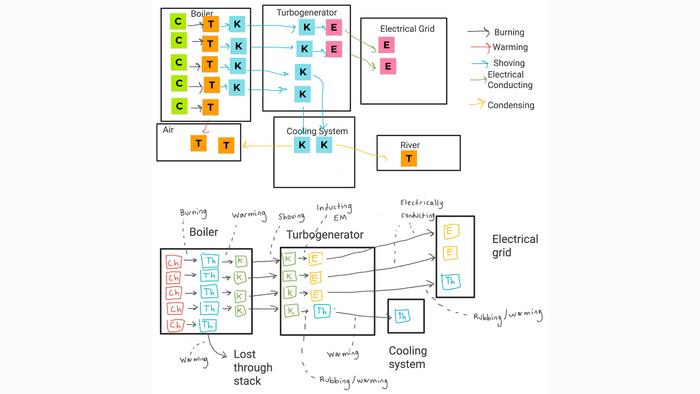WASHINGTON, Sept. 6, 2023 – Large-scale energy generation projects depend on economics and politics as much as they do on the availability of natural resources and raw materials. Power plant output also extends far beyond electricity, producing a variety of scientific, ethical, ecological, and cultural impacts across multiple scales, ranging from local to regional, state, national, and global effects.

Credit: Credit: Rachel E. Scherr, Lane H. Seeley, and Kara E. Gray
WASHINGTON, Sept. 6, 2023 – Large-scale energy generation projects depend on economics and politics as much as they do on the availability of natural resources and raw materials. Power plant output also extends far beyond electricity, producing a variety of scientific, ethical, ecological, and cultural impacts across multiple scales, ranging from local to regional, state, national, and global effects.
Researchers from the University of Washington Bothell and Seattle Pacific University discussed the importance of contextualizing physics principles. In The Physics Teacher, a journal co-published by AIP Publishing and the American Association of Physics Teachers, they outlined how teachers implemented case studies to teach about energy and the realities of power plants.
“During the pandemic, a lot of us had a reexamination of the education that we were offering, a chance to really look at why it is important and what its purpose is,” author Rachel Scherr said. “Ultimately, science education should be providing a basis for decision making, and we should be enabling students to participate in scientifically responsible decisions that affect their lives and their communities.”
Scherr and her collaborators share their latest updates on a multi-year project geared toward supporting physics educators in new forms of teaching about energy that connect students with the realities of physics beyond the classroom. Their study examined how a set of teachers applied this holistic approach to analyze the social and cultural impacts of Plant Scherer in Georgia. The authors also accounted for student experiences in a course investigating dams in the Skagit River Hydroelectric Project, including research on relicensing, local resistance, salmon relocation engineering, and tribal restoration projects.
“We’ve been supporting teachers for a few years now to really think about the equity issues related to power plants and the role of equity in community decision making,” Scherr said. “Equity has to do with not just the power plant itself, but the relationship of the power plant to the lands and waters and air that surround it, as well as human, plant, and animal communities.”
Their work exemplifies that removing abstraction from physics education—and reconnecting power plants to the rest of the planet—prepares students to engage in community decision making and understand energy in its many social and cultural contexts.
“Technology, infrastructure, and energy resource decisions are partly scientific decisions, and classes that prepare young people to participate in decision making is a shared value for scientists,” Scherr said.
“There is so much to be gained from placing these kinds of analyses in their context, where they have consequences for people and for the natural world. It’s a natural extension that helps to make the physics we learn meaningful.”
###
The article, “Energy in its material and social context: Power plants,” is authored by Rachel E. Scherr, Lane H. Seeley, and Kara E. Gray. It will appear in The Physics Teacher on Sept. 6, 2023 (DOI: 10.1119/5.0111211). After that date, it can be accessed at https://doi.org/10.1119/5.0111211.
ABOUT THE JOURNAL
Dedicated to the strengthening of the teaching of introductory physics at all levels, The Physics Teacher includes tutorial papers, articles on pedagogy, current research, and news in physics, as well as history, philosophy, and biography. See https://pubs.aip.org/aapt/pte.
About AAPT
AAPT is an international organization for physics educators, physicists, and industrial scientists with members worldwide. Dedicated to enhancing the understanding and appreciation of physics through teaching, AAPT provides awards, publications, and programs that encourage teaching practical application of physics principles, support continuing professional development, and reward excellence in physics education. AAPT was founded in 1930 and is headquartered in the American Center for Physics in College Park, Maryland.
###
Journal
The Physics Teacher
DOI
10.1119/5.0111211
Article Title
Energy in its material and social context: Power plants
Article Publication Date
6-Sep-2023



